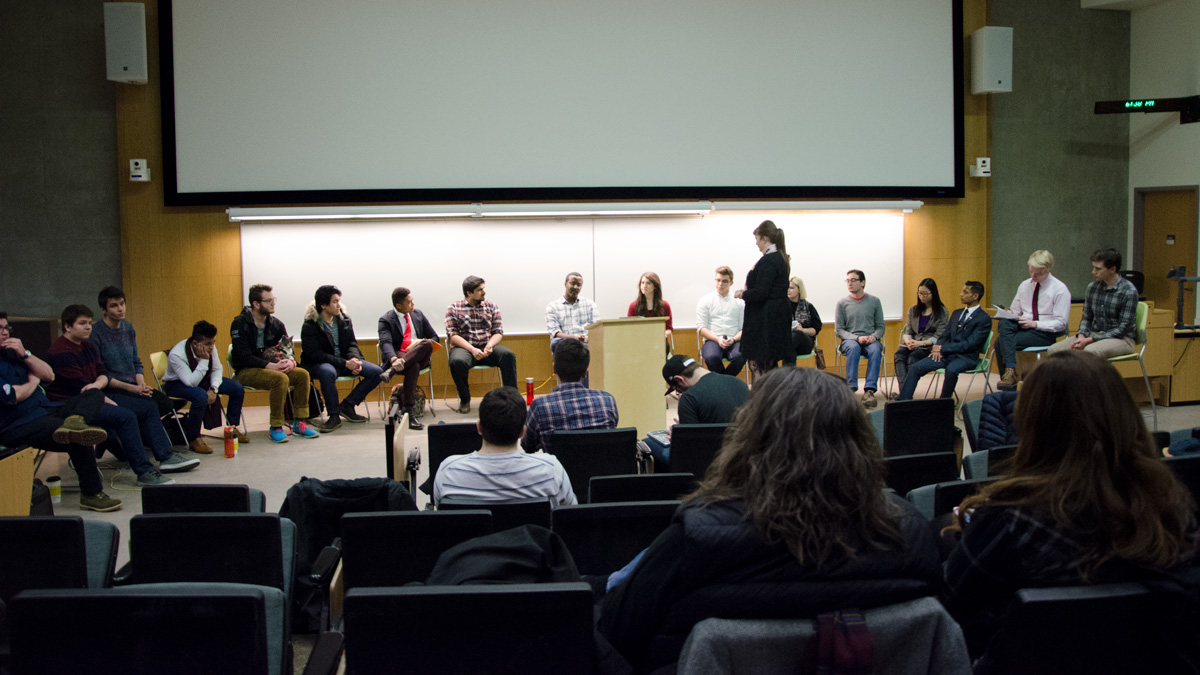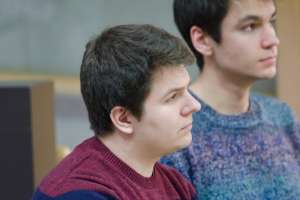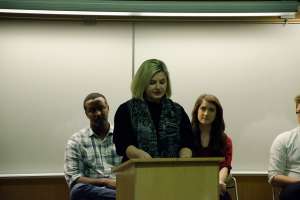Forum Recap: Peter Lougheed Leadership College
 Mitch Sorensen
Mitch SorensenPeter Lougheed’s Presidential Debate
- Read our introduction to the Presidential candidates and their platforms here: SU Elections Q&A: President
Presidential candidates faced off on teamwork, inclusivity, and the Peter Lougheed Leadership College forum.
After introductions, current Vice-President (Academic) and Presidential candidate Marina Banister asked competitors Bashir Mohamed and Donut the Cat how they’ll work with their Vice-Presidents if their platform points differ. Mohamed responded that the highest priority lies with communicating with other executives. Ultimately, he said, they’re all adults who should be able to solve problems together. In response to her own question, Banister cited her experience working under current President Fahim Rahman, who “set a good example” of how to support Vice-Presidents rather than micromanage them.
“That’s the sort of leadership I would like to take to the Students’ Union executive if I’m elected,” she said. “Supporting my Vice-Presidents in their positions, answering any questions that they might have, as well as working as a really cohesive unit.”
Donut the Cat suggested having a cat tower in the executive offices where students could come pet her.

When questioned by Mohamed about how her platform point to create a student charter of rights would differ from the rights already outlined in the student code of conduct, Banister highlighted the importance of having one consolidated document. She added that many Canadian universities, such as McGill University, have implemented charters to address issues involving residence or harassment. She said she would create a group with campus stakeholders to decide what should be included in the charter.
Donut the Cat wanted to know how her fellow candidates would ensure student services on campus meet their mandates. Banister said as current a executive, she already meets with the managers employed by the Students’ Union and would continue to do so if elected President. Mohamed cited the university’s long wait times and high fees for childcare as something that should be re-evaluated.
Cristina Stasia, Director of Instruction at the Peter Lougheed Leadership College and the moderator of the forum, asked all candidates who they think is missing from decision-making at the U of A and how they would include them.
Mohamed said the Students’ Union needs to be reformed because most issues are talked about at an executive level, not at the student level. He said he’s pushing for the creation of an advocacy office so students can address issues including racism, homophobia, and misogyny. He also said the executive team needs to engage with councillors more.
“Council is the boss of the executive,” he said. “For the past few years it’s become the opposite. We need to make sure council is more politically engaged in order to ensure that these issues are brought up.”
During question period, Arts councillor Ben Angus asked the candidates how they would change the image of the Peter Lougheed Leadership College considering the negative press it’s been receiving. Banister and Mohamed were both councillors when the college was introduced.
Mohamed answered that he’s advocating for intensive programming for 10,000 students, something he said the college initially promised but hasn’t done yet. He added that the college should be reflecting on the bad press and seeing how they can make the college better for all students on campus.
Banister, who has sat on the college’s oversight committee, said her experience has provided her with insight into the nuances of the college. She thinks it needs to be communicated that the college isn’t training leaders — it’s giving students leadership skills. However, she said she also thinks the university should be investing in other leadership opportunities.
Operating on an $11 million budget
- Read our introduction to the Vice-President (Operations and Finance) candidates and their platforms here: SU Elections Q&A: Vice-President (Operations and Finance)
Being the only candidate in attendance, current Vice-President (Operations and Finance) candidate Robyn Paches laid out his platform to the Lougheed College Forum’s audience. Seeking a second term, Paches hopes to complete the projects in 2017-18 that he began in his first term, such as the Myer Horowitz Theatre renovation.
“I’m not the kind of guy who leaves things hanging,” Paches said.
Paches said he wants to making sure student consultation is incorporated into the Myer Horowitz renovations next year. His other two platform points involved making Room at the Top and Dewey’s more appealing places for students, and making sure maintenance issues are resolved on campus.
“What I want to do is to bring students back to campus,” Paches said
Chen Liang, the only other contender for VP (Operations and Finance), was unable to attend the forum. Since only one candidate from the race was present, candidates were unable to question each other.
Tuition? Mental health? Housing? Yep, it’s the VP (External) race
-
Read our introduction to the Vice-President (External) candidates and their platforms here: SU Elections Q&A: Vice-President (External)
The candidates for Vice-President (External) discussed what issue would be tackled first if they would be elected. Second-time (External) runner Reed Larsen, correctional officer Ankur Pandey, Education Students Association executive James Thibaudeau, and international student Lisa Zhang,
Zhang considered the most pressing issue to be student employability. Her proposal included advocating for the expansion of the provincial Summer Temporary Employment Program, also known as STEP, to increase opportunities and meaningful experience for students.
Mental health was a non-negotiable issue for Thibaudeau. He hoped for more resources on campus and funding from the province, and said it would be the first thing he hoped to accomplish if elected.
“Mental health funding would be the first thing I would be implementing,” said Thibaudeau.
Thibaudeau added that he would advocate to the province for a sustainable tuition model that would allow fees to rise annually and predictably with inflation.
Pandey said the first thing he would do if elected would be to make campus life for non-domestic students the first issue he would tackle. He also said he wanted to maintain the tuition freeze, and questioned why tuition freezes could not be granted to international students.
“I want to get a tuition freeze for all students,” Pandey said.
For Larsen, developing materials for first-time renters moving to Edmonton was an absolute priority. He guaranteed that these resources would be out by September to aid students returning and entering the U of A.
“Students should be able to rent properly the first time,” said Larsen.
Alone and Academic
- Read our introduction to the Vice-President (Academic) candidates and their platforms here: SU Elections Q&A: Vice-President (Academic)
Vice-President (Academic) candidate Shane Scott started off the night with a summary of his three key platform points: supporting student representatives by improving departmental association advocacy, getting students access to a multi-faculty syllabus database, and collecting data on classroom diversity and the academic experiences of different university groups.
Scott’s only opposition, Banana the Hamster, was unable to attend the night’s forum. Scott, however, was questioned about about efforts to increase inclusivity of student groups in student governance. He responded that intersectional approaches to diversity are important, and added that increased inclusion of indigenous students in student governance is a priority.
“(Indigenous students) are often overlooked,” Scott said. “There’s a lot of room for growth there.”
Students-in-Residence
- Read our introduction to the Vice-President (Student Life) candidates and their platforms here: SU Elections Q&A: Vice-President (Student Life)
The Vice-President (Student Life) debate focused heavily on student advocacy in residence and leadership on campus.
Candidate Rabib Alam opened the debate by asking his fellow candidates how they’ll give equal attention to all residences. Kyle Monda said that his solution would be to run individual awareness campaigns in every residence on campus, while Ilya Ushakov said he would consult each residence individually in order to learn about their unique issues. Alam said his approach would involve setting up individual Students’ Union committees for each residence to provide advocacy unique to each constituent’s needs.

Next, Monda asked candidates how they would set up a residence association for the new Peter Lougheed Hall. Ushakov stated students living there will require advocacy and should elect their own representatives, but “if there is no one living there (due to high rent costs), no one will be elected.” Alam said that an advocacy body would be needed and that consultation with Students’ Union representatives would help ensure the right processes are followed. Monda responded that the VP (Student Life) will need to consult with these students to see if they wish to form their own body or join the existing East Campus Students’ Association (ECSA). If they choose the latter, Monda said the ECSA should be consulted on whether they have enough resources to accommodate a new residence.
As a final question, Ushakov asked candidates what leadership means to them, and what role it plays on campus. Alam said leadership can be fostered on campus not just through institutions such as the PLLC, but by consulting students and giving them a voice on issues that affect them. Monda said leadership is about knowing not just when to lead, but “also knowing when to follow,” — meaning that the new VP (Student Life) needs to be able to continue important projects of their predecessor, as well as start new initiatives. Ushakov said he sees leadership as being passionate and engaging, and that this can create accessibility to groups on campus.
BoG-ged down because the forum was two hours long
-
Read our introduction to the Board of Governors Representative candidates and their platforms here: SU Elections Q&A: Undergraduate Board of Governors Representative
Board of Governors’ Representative (BoG Rep) candidates Armand Birk and Mike Sandare had their first debate tonight.
The candidates discussed whether the BoG Rep position should be more formalized, and if so, in what ways. They also discussed how they would make sure voices of all students on campus would be heard.
Sandare acknowledged that the students’ relationship with the Board of Governors can often feel unidirectional, and that the ways students have to interact with it are unintuitive and uninteresting.
“We need to focus on a community-building aspect, with focus groups and consultations,” Sandare said. “Are these things students really want to come up to? The answer is most students find them too boring.”
Birk believes that the way student bodies interact with the Board of Governors needs to be tailored to them specifically.
“I live in a residence and now I’m the president of Kappa Sigma,” Birk said. “All of those are small places, and I see the university from so many sides … I want to make it personal for every faculty, every group, so we’re not just looking at consultation for what these people say.”
Both candidates agree that regulated office and work hours should be implemented for the BoG Rep position, but apart from that, Sandare hopes to use focus groups to inform his Board advocacy.
“Our student voice needs to be heard,” Sandare said. “By gathering the living experiences and stories of students at large … we can add value to what the board of governors’ representative is — and that’s how I think we could really improve the role.”
Birk said he hopes to inform his advocacy with surveys and quantified data. He added that while the Post-Secondary Learning Act defines the role for the government side, he said the role currently has a lot of ambiguity from the perspective of students, which he hopes to change.
“There’s a reason this position has historically had few candidates,” Birk said. “People don’t understand the position, they don’t feel like they’re contributing because they don’t know what they do… We need to use the current council to help students better understand the role.”
Pandering Plebiscites
The Peter Lougheed Leadership College forum opened with a short introduction, and an even shorter introduction, as Alberta Public Research Group (APIRG) plebiscite “Yes” side manager Laura Kruse. Kruse, whose campaign is asking whether full time students wish to continue to pay a $3.50 opt-outable fee per semester and $1.75 for part-time students, faced off with her plebiscite’s “No” side, Alexander Rodd.

Kruse said APIRG was important in combatting wage inequity in Canada, a higher wage gap between men and women in Alberta, and local increasing anti-immigration sentiment, while Rodd said his side of the campaign was being run because “APIRG does not provide value to students.” He added that even though the APIRG fee is optional, he expressed that students may not know how to opt out.
Rodd questioned Kruse on why APIRG asks for a $500 deposit on equipment rentals. She replied that the deposit was to ensure the equipment is returned, and that the deposit is refunded upon return. When Kruse asked Rodd why he was running a campaign to defund APIRG when he has the option of opting out, he replied that it was because few students were aware they were paying the fee.
“In the 10 to 15 classes I’ve visited in the past few days, about three people raised their hand (when I asked them if they knew what APIRG was),” he said.
Kruse said that historically, the value APIRG has spent on advertising that the fee is opt-outable is higher than the value of the how many opted out.
“That changed a bit when the Students’ Union moved its opt-out service online, but that’s how it’s gone down,” Kruse said.
Referenda
- Read previous coverage of the reference: Students to vote on food bank fee, future U-Pass cost
U-Pass campaign representative Fahim Rahman made brief remarks during the forum, focusing on three points in his introduction: affordability, convenience and the continuing improvements made in transit. The U-Pass referendum is asking whether students will pay the following:
- $145.00 in 2017-2018
- $148.00 in 2018-2019
- $153.00 in 2019-2020
- $158.00 in 2020-2021
The Campus Food Bank also introduced its Dedicated Fee Unit (DFU) ask of $1 per student, per semester. Food bank representative Heinrich Piodos said the food bank is looking for stable student funding because it’s been seeing a rise in use — in the past year, food bank access has increased by 21 per cent.
The next scheduled forum, SUBStage 1, will be held at 12 p.m. on March 1. Candidates from the President, VP (Operations and Finance), and the VP (Student Life) races will face off. They will be joined by the U-Pass and the Campus Food Bank referenda.





A reminder to all to abide by our Community Guidelines when commenting. If these rules aren’t followed, comments will be deleted. Thanks!
LOL Peter Lougheed Leadership College is such a joke. Like one third of students had already quit from the college for both the inaugural class and the 2016-2018 cohort. Everyone who joined this college did not give a sh*t about leadership. All they cared for is the “bribe” Cody Bondarchuk talked about in his article. Overall, this college accomplishes nothing useful to society or the university. It’s crap. PLLC takes money from the U of A where that money could be used to better students and improve infrastructure.
Hey guys, thanks for doing this!
Just a quick note, I wouldn’t have said that I’m on a permanent visa because I was born in Victoria haha. Full on Canadian 🙂
Thank you!
Hi again! #YesAPIRG here! Another correction: No fees in spring/summer semester! Just for f/w. The 1.75 figure is for part time students.
Hi There Laura,
Our apologies, the information has been corrected. Thanks for letting us know!
Hi Laura (#YesAPIRG) here! Two corrections. APIRG Yes Side Manager is named Laura Kruse, not Cruse, and the fee is $3.50 in Fall and Winter Terms for full time students, 1.75 for Part Time students.